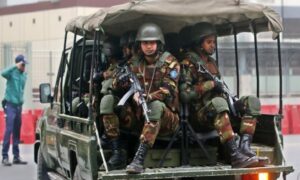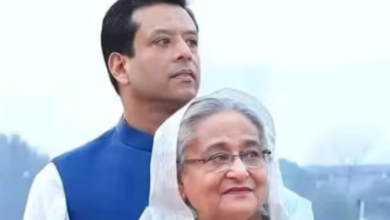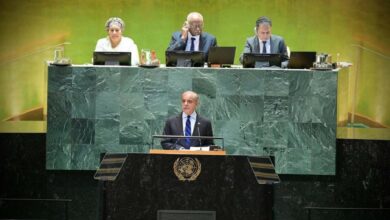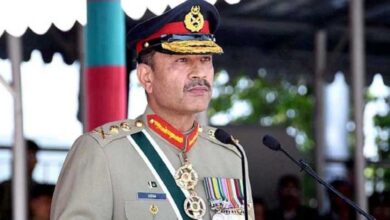Power of Special Executive Magistrate to Army: Positive decision of Bangladesh Government to restore order
In the current situation of the country, the related experts have commented that giving the special executive magistrate power to the army to maintain the overall situation normal including maintaining law and order is positive. According to them, after the fall of the dictatorial government, the structure of the country’s law and order, administration, judiciary and other institutions have collapsed. Such a decision was necessary under the existing circumstances. It would have been better if it had been taken earlier. They said these things on Wednesday.
In a notification issued by the Ministry of Public Administration on Tuesday, the army was given magisterial powers. It was informed that the army officers have got the power to enforce 17 sections of the Criminal Procedure Code (CRPC). The sections are 64, 65, 83, 84, 86, 95 (2), 100, 105, 107, 109, 110, 126, 127, 128, 130, 133 and 142. Senior lawyer of the Supreme Court Subrata Chowdhury said that after the fall of the dictatorial government, the structure of the country’s law and order, administration, judiciary and other institutions collapsed. An interim government has taken over, but unrest continues everywhere. A class of people are committing all kinds of wrongdoing including extortion on the sidewalk. On the other hand, those who are in various responsibilities in various institutions are also doing various activities to endanger the current government. People are not able to trust the police as they are accomplices of dictatorship. As a result, such an initiative to bring back the overall situation of the country by giving such power to the army is positive. However, the situation would have improved if this step had been taken sooner rather than later.
Advocate Tasmeer Uday said that the government has assigned the duty of special magistrate to all the commissioned officers of the army as per Section 12(1) of the CrPC, which will mainly function outside the metropolitan area. And within the metropolitan area will assist the Executive Magistrate under the ‘Aid to Civil Administration’, which is already in force.
He said, the purpose of giving the power of magistracy to the army seems to be mainly in the interest of improving the overall law and order of the country. Because the reality is that the civil and police administration of the country is not as effective as it used to be. Crime will be brought under control to a large extent if the Army conducts operations under the provisions mentioned in the notification. Another thing to be remembered is that the army will not do all the duties of the magistracy. As per Section 17 of CrPC they will perform duty under the District Magistrate. As a result, it is hoped that a balance will be maintained. He also said that it should be remembered that a large part of the police has not yet come to their respective workplaces. Since the police as an institution has been questioned while carrying out the illegal orders of the dictatorial government, the policemen have lost their morale and they are not able to work at the field level voluntarily or involuntarily. In this situation, I think there was no option to give this power to the army to maintain law and order.
Former Inspector General of Police (IGP) Md. Nurul Huda said that currently the law and order situation in the country is not stable. There is some kind of unrest going on among those who are responsible for security. Apart from this, unrest is going on in various areas including industrial areas. It is positive to give such responsibility to the army for a temporary period to keep the overall situation normal throughout the country.
Under the Code of Criminal Procedure, 1898, what is said in the relevant sections: Section 64 of the Cr.P.C.: deals with offenses committed in the presence of a Magistrate. When the Magistrate finds that an offense is being committed before him, he can arrest or order the arrest of the offender.
Section 65 CrPC: This section describes arrest by or in the presence of a Magistrate. He can issue a warrant of arrest against him after taking him for trial. Or he can order his arrest.
Section 83 of CrPC: When a warrant of arrest is required to be executed beyond the local limits of the jurisdiction of the court, the court may send the warrant of arrest by post to the Executive Magistrate or Superintendent of Police or Commissioner of Police of the district without directing the police officer.
Section 84 of CrPC: This section describes the provisions for execution of warrant of arrest in areas outside the jurisdiction of the Magistrate. According to this section, the Officer-in-Charge (OC) shall take the approval of the Magistrate or higher police officers of the concerned area for execution of warrant of arrest outside the area. If this authorization is given, it will be assumed that those who have given the authorization have ordered the execution of the arrest warrant.
Section 86 CrPC: This section describes the procedure to be followed by the Magistrate after producing the arrested person before the Magistrate.
Section 95 (2) of CrPC: This section provides that only Magistrates can direct postal or telegraph authorities to deliver documents to a specified person. At the same time, postal and telegraph authorities may conduct search or seizure of such articles.
Section 100 of CrPC: This section provides for the rescue of those who have been wrongfully detained.
Section 105 of CrPC: Can order Magistrate to search in his presence. The person may be physically present during the search of the place where he may order it to be searched.
Section 109 of CrPC: This section describes the provisions for the conduct of vagrants and suspected persons.
Section 110 of CrPC: This section deals with behavior bond for habitual offenders. That is, those who habitually engage in repeated theft, robbery, kidnapping, fraud, the magistrate will take bail from them.
Section 126 of CrPC: This section describes the exemption of sureties. That is, the person who stands surety for the accused has some responsibility. If he thinks that it is not possible for him to fulfill his duty, then he can apply to the court.
Section 127 of CrPC: This section describes the provisions relating to the dispersal of public assembly by order of the Magistrate or the police. An Executive Magistrate or the OC of a police station may order the dispersal of any unlawful assembly or any assembly consisting of five or more persons causing disturbance of the public peace.
Section 128 of CrPC: This section provides for the use of civil force to disperse public gatherings.
Section 130 of CrPC: When an Executive Magistrate or Commissioner of Police decides to use military force to disperse an assembly, he may order and arrest a commissioned officer of the Bangladesh Army or a non-commissioned officer who is in charge of any unit of the Bangladesh Army for the use of military force to disperse the assembly. It can be used for arrest. That is, military officers can arrest and detain those who disobey orders, as per the orders of the magistrate. But they will be very conservative in the use of force.
Section 133 of Cr.P.C.: This section provides that, when a District Magistrate or any other Executive Magistrate receives a police report or any other information that the public is or may be lawfully using any road, river or canal from any place of public use or Can order removal of nuisance.
Section 142 of CrPC : Section 142 of CrPC provides that if the Magistrate, while passing an order under Section 133, considers that immediate action is necessary to prevent serious imminent danger or harm to the public, he shall, subject to settlement, take such measures as may be necessary to avert the danger or prevent harm against the person who Ordered, will issue such order.
Magistrate power for the benefit of the people-Home Affairs Adviser: Home Affairs Adviser Md. Jahangir Alam Chowdhury commented that the army has been given the power of magistracy (judicial power) for the benefit of the people. He made this comment in reply to the questions of journalists present after the closing parade of the 40th BCS (Ansar) Cadre Officers and 25th Batch (Male) Recruit Sepoy basic training of Bangladesh Ansar and Village Defense Force at Bangladesh Ansar and VDP Academy in Safipur, Gazipur on Wednesday.
The Home Affairs Adviser said, since the army has been in the field for a long time, they have to work within a capacity. Again there is a shortfall in our other forces, the army is brought in to fill it. And the people of Bengal will enjoy the magistracy of this army.
The army will leave when people’s trust returns – Information Advisor: The army has been given magisterial powers to ensure public security, said Nahid Islam, advisor to the Ministry of Information and Broadcasting. On Wednesday afternoon, he said in the secretariat, we are currently in an emergency situation, the country has to be restructured. For this reason, the army has been given this power for only 60 days in some sections. Once the police force is fully reformed and the people’s confidence is restored, the army will return with the responsibility of the police.
The administration will not create conflict between the cadres – Public Administration Secretary: Senior Secretary of the Ministry of Public Administration. Mokhles ur Rahman said that the army has been given the power of executive magistrate so that people feel safe and can move in a friendly environment. In this case the administration will not create any conflict between the cadre officers. He also said in the secretariat on Wednesday that this initiative has been taken so that people can move in a more people-friendly environment, feel safe and have trust among people. This power is given for the message that all the forces are working simultaneously under the same umbrella. He said, it is not the power of any cadre, it is the power of the state. There will be no conflict. One state, one people, one government. You work for public interest, I work. It will give good results.





